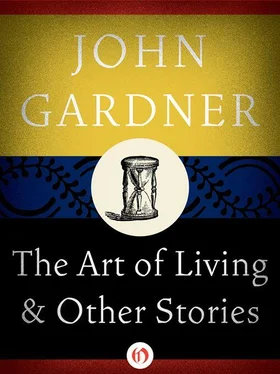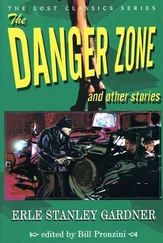John Gardner - The Art of Living - And Other Stories
Здесь есть возможность читать онлайн «John Gardner - The Art of Living - And Other Stories» весь текст электронной книги совершенно бесплатно (целиком полную версию без сокращений). В некоторых случаях можно слушать аудио, скачать через торрент в формате fb2 и присутствует краткое содержание. Год выпуска: 2010, Издательство: Open Road Media, Жанр: Современная проза, на английском языке. Описание произведения, (предисловие) а так же отзывы посетителей доступны на портале библиотеки ЛибКат.
- Название:The Art of Living: And Other Stories
- Автор:
- Издательство:Open Road Media
- Жанр:
- Год:2010
- ISBN:нет данных
- Рейтинг книги:4 / 5. Голосов: 1
-
Избранное:Добавить в избранное
- Отзывы:
-
Ваша оценка:
- 80
- 1
- 2
- 3
- 4
- 5
The Art of Living: And Other Stories: краткое содержание, описание и аннотация
Предлагаем к чтению аннотацию, описание, краткое содержание или предисловие (зависит от того, что написал сам автор книги «The Art of Living: And Other Stories»). Если вы не нашли необходимую информацию о книге — напишите в комментариях, мы постараемся отыскать её.
The Art of Living: And Other Stories — читать онлайн бесплатно полную книгу (весь текст) целиком
Ниже представлен текст книги, разбитый по страницам. Система сохранения места последней прочитанной страницы, позволяет с удобством читать онлайн бесплатно книгу «The Art of Living: And Other Stories», без необходимости каждый раз заново искать на чём Вы остановились. Поставьте закладку, и сможете в любой момент перейти на страницу, на которой закончили чтение.
Интервал:
Закладка:
The younger man continued to study him. He was a thin, sallow person of thirty-five or forty, dressed in a black suit with a black waistcoat and black bow tie. His forehead was high and queerly narrow, like the forehead of a horse, and his eyes, which blinked continually, were unnaturally bright and alert, like a chicken’s.
“Perhaps the music was not a joke,” the young man said, and smiled in a way that might have been malicious.
Professor Klingman merely looked at him and raised his right hand to his hearing aid.
“Perhaps you alone, in all that fat, complacent audience, understood tonight’s music,” the young man said.
“Yes, perhaps,” the professor said tentatively, slowly lowering his hand. He cautiously waited for things to become clearer.
“Let me explain myself,” the young man said. He leaned forward, vaguely aggressive, still rapidly blinking, placing his strikingly long white fingers on each side of his glass. “I grew up in a clergyman’s family, in a very small town not many miles from here. There reigned in our home a punctilious cleanliness and a pathetic, bookish optimism. We breathed an atmosphere of dusty pulpit rhetoric — large words for good and evil which I have learned to hate, since perhaps they are to blame for all our human sufferings.”
Professor Klingman touched his chin, considering.
“For me,” the young man hurriedly continued, “life consisted entirely of those grandiose words, since I knew nothing more of it than the infinite, insubstantial emotions they called up in me. From people I expected divine virtue or hair-raising wickedness; from experience either ravishing loveliness or consummate horror. I was full of avidity for all that existed, and full of a passionate, tormented yearning for True Reality, whatever form it might take, intoxicating bliss, undreamt-of anguish.
“I remember my first disillusionment. There was a fire one night in my parents’ house. It spread insidiously until the whole first floor was in flames, and soon the stairs would be on fire. It was I who discovered it. I went rushing through the house shouting, ‘Fire! Fire!’ I know what emotion underlay those cries, though at the time it may not have come fully alive to my consciousness. ‘So this,’ I thought, ‘is a fire. This is what it’s like to have a house on fire. Is this all there is to it?’
“Heaven knows, it was serious enough. The whole house burned down; only with difficulty was the family saved, and I myself got some nasty burns. It would be wrong to say that my fancy could have painted anything much worse than the actual burning of my parents’ house. Yet some vague, formless idea of an event that was even more frightful must have existed somewhere within me, by comparison with which the reality seemed flat. This fire was the first great event in my life.
“I need not go on to recount all my various disappointments in detail. Suffice it to say that I zealously fed my magnificent expectations of life with the matter of a thousand books. Ah, how I have learned to hate them, those poets who chalk up grand words on all the walls of life — because they had no power to write them on the sky with penpoints dipped in Vesuvius! I came to think every large word a lie and a mockery.
“Ecstatic poets have said that speech is poor: ‘Ah, how poor are words!’ they bleat. But no, sir! Speech is rich, extravagantly rich compared with the poverty of actual life. Pain has its limits — physical pain in unconsciousness, mental pain in torpor. The same is true of joy. Our human need for communication has found itself a way to create sounds which lie beyond these limits.
“Is the fault mine? Is it down my spine alone that certain words can run so as to awaken intuitions of sensations which do not exist?”
There was no question now of the malevolence in the young man’s smile. But old Alfred Klingman, who’d spent a lifetime teaching the young and outraged, watched him with a look that seemed more bafflement than horror. He may have felt even a touch of admiration for the man’s rhetoric.
The young man said, leaning even nearer: “But you, my friend, as a music lover, must understand that the disappointment I’ve thus far delimited is nothing by comparison with the disappointment I have yet to describe. The moment my father first saw me in the crib, with these fingers that reach out like tentacles, he cried out, ‘A pianist! The Dear Lord has sent us a pianist!’ I could reach a full octave at the age of seven. And I was rhythmically talented, and had perfect pitch. I amuse acquaintances by telling them the frequencies of pistol shots, car crashes, screams for help. The point is this: what are a poet’s lying words to the rich and the secret intimations of a piano chord, a great pipe organ, an orchestra, a voice? I’ve searched the globe for some firm reality that could give me even the shadow of a hint that our musical intuitions are not madness. I’ve stood before the greatest works of sculpture, and I’ve thought, ‘Yes, it’s beautiful. Is that all there is?’ I’ve looked up from Zermatt at the Matterhorn and thought, ‘very like the postcards.’ I watched a friend die. It was just as I’d expected.”
The young man smiled as if consciously laboring to make his smile ferocious. “That is why I compose as I do, my dear music lover.”
Professor Klingman said, “You, then, are the composer of—” He said it almost casually, as if merely checking an earlier conclusion.
“I am,” the young man said fiercely, and waited.
Perhaps as much as a minute passed. At last Professor Klingman took off his glasses to wipe them again. He did this slowly and carefully, his fingers trembling. He hooked the glasses back over his ears, folded his handkerchief, then changed his mind, unfolded it, and blew his nose. He noticed that he still had his hat on, and removed it, carefully setting it down on the table. “I’m flattered that you should tell me all this,” he said softly, tentatively.
The young man waited. He seemed to be growing more angry by the minute.
Professor Klingman sat nodding slowly and thoughtfully, nervously smiling. Finally he said, as if he had no idea what else to say, “My wife was a pianist.”
He began then, slowly and patiently, to explain what she had meant to him, though of course his feeling was impossible to put into words.
TRUMPETER
Queen Louisa’s dog, Trumpeter, was nobody’s fool, which is one of the reasons he kept mostly out of sight, taking care of himself, harmlessly chasing a rabbit now and then, soaking up the sun in the cemetery — where no one ever went — one eye half open, on the watch for trespassers, sometimes wandering through the alleys of the village, peeking in through windows when the sun had set, observing how shopkeepers counted up their money unaware of the servants who peered from every curtain and hungrily eyed those stacked silver coins, and then again sometimes pausing by old shanties where cutpurses met, filling the night with their blasphemous obscenities, and where there were smells, everywhere, of bile and perspiration and unwholesome drink, still other times trotting to the foul black wharf, where old merchant ships bumped against the waterlogged planks and young sailors snored and whistled in the arms of drunken maidens and sometimes a pirate slipped silent as a reptile from fog-wisp to fog-wisp, wetly smiling, carrying his parrot and rum. Sharp ears lifted, burning eyes narrowed into needle-thin slits, Trumpeter would listen to whatever unrighteousness came drifting his way, and then he would lift his leg, leave his warning, and move on.
Trumpeter knew, as no one else did, all that was afoot in the kingdom of mad Queen Louisa. Not that he took undue pride in this. It was his nature, as a dog, to keep track of things, to be a jealous guardian, eternally alert. Even when, unbeknownst to them all, he lay in a corner of Queen Louisa’s room, or slept with his head on his paws behind the stove, or bared his fangs to keep the cat on his toes — for the cat was an old one and weary of mice — Trumpeter’s mind was on one subject: the welfare of the kingdom. This was, so to speak, what he was paid for. Not that Trumpeter could really be called paid . But Trumpeter was no haggler, never one to stand on ceremony. It is true, he would admit, that the people of the castle almost never spoke to him and, once they’d grown used to him, hardly looked up when he went gliding like an angel of death through the room; but sometimes when he rubbed against Queen Louisa’s shoulder she would give him a brief, absentminded pat, and on rare occasions, for no discernible reason, she’d say, “Sit, Trumpeter,” or, “Down — for the love of God , boy!” or, “Outside!” As for the others, they paid to Trumpeter no attention whatsoever, merely obeyed him as they obeyed the King or Queen, without thought or hesitation. When he stood by the door, they opened it. When he stood by the cupboard, they filled his dish. When he barked, they went over furtively and peeked out the window.
Читать дальшеИнтервал:
Закладка:
Похожие книги на «The Art of Living: And Other Stories»
Представляем Вашему вниманию похожие книги на «The Art of Living: And Other Stories» списком для выбора. Мы отобрали схожую по названию и смыслу литературу в надежде предоставить читателям больше вариантов отыскать новые, интересные, ещё непрочитанные произведения.
Обсуждение, отзывы о книге «The Art of Living: And Other Stories» и просто собственные мнения читателей. Оставьте ваши комментарии, напишите, что Вы думаете о произведении, его смысле или главных героях. Укажите что конкретно понравилось, а что нет, и почему Вы так считаете.












